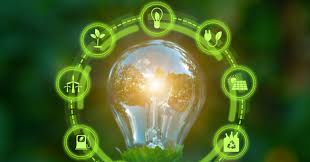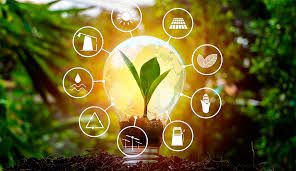Energy conservation refers to the practice of reducing energy consumption and waste to preserve natural resources and reduce environmental impact. It involves using energy-efficient technologies, implementing sustainable practices, and minimizing energy waste to ensure a more sustainable and responsible use of energy resources.
Energy conservation helps mitigate climate change, reduce greenhouse gas emissions, and promote the efficient use of energy in various sectors like transportation, industry, and households.
Energy is the lifeblood of modern society, powering our homes, industries, and transportation systems. However, as the global population grows and industrialization spreads, the demand for energy has surged, leading to concerns about its sustainability and environmental impact.
Energy conservation is a fundamental concept that offers a viable solution to these challenges. It is a holistic approach aimed at reducing energy consumption, curbing wastage, and promoting a more sustainable and responsible use of resources.
The Need for Energy Conservation
1. Environmental Concerns: One of the primary drivers of energy conservation is the growing awareness of environmental issues, particularly climate change. The burning of fossil fuels for energy is a major source of greenhouse gas emissions, contributing to global warming and its associated consequences. Energy conservation is a powerful tool in reducing these emissions by decreasing the need for fossil fuels.
2. Resource Depletion: Fossil fuels, the dominant source of energy, are finite resources. Energy conservation helps extend the lifespan of these resources, ensuring they are available for future generations. It also lessens the pressure to extract and transport fuels, minimizing the associated environmental risks.
Strategies for Energy Conservation
1. Energy-Efficient Technologies: The development and adoption of energy-efficient technologies are central to conservation efforts. These include LED lighting, smart thermostats, energy-efficient appliances, and advanced industrial processes that reduce energy waste.
2. Renewable Energy: Transitioning to renewable energy sources like solar, wind, and hydropower is a key aspect of energy conservation. These sources generate electricity with minimal environmental impact and can replace fossil fuels in many applications.
3. Behavioral Changes: Individual and collective actions play a crucial role in energy conservation. Simple practices like turning off lights when not in use, unplugging devices, and optimizing heating and cooling systems can lead to significant energy savings.
4. Building Design: Designing energy-efficient buildings with proper insulation, efficient HVAC systems, and natural lighting reduces the energy required for heating, cooling, and lighting spaces.
5. Transportation: Promoting public transportation, carpooling, and the use of electric or hybrid vehicles can greatly reduce energy consumption in the transportation sector.
Read Also: Best Used Batteries Management Complete Guide
The Importance of Energy Conservation

Imagine a world where the lights never go out, our homes stay cozy, and our gadgets keep running without worries. This dream can come true if we understand and practice energy conservation. In simple terms, energy conservation means using less energy to do the same things we love.
Let’s explore why it’s important:
1. Save Money: When we use less energy, we pay less on our energy bills. It’s like having extra money in our pockets for other fun things.
2. Protect the Environment: The way we produce energy, like burning fossil fuels (coal, oil, and gas), can harm our planet. It pollutes the air and cause climate change. Energy conservation reduces pollution and helps keep our Earth clean and healthy.
3. Preserve Resources: Some sources of energy, like coal and oil, won’t last forever. By using less energy, we make sure there’s enough for us and the generations that come after us.
4. Fight Climate Change: Climate change is a big problem caused by too much carbon dioxide in the air. When we save energy, we release less of this harmful gas, helping to slow down climate change.
5. Create Jobs: When we invest in energy-efficient technologies and renewable energy sources like wind and solar, we create jobs and boost our economy.
6. Improve Comfort: Energy conservation isn’t just about turning off lights; it’s also about making our homes and buildings more comfy. Proper insulation, efficient appliances, and smart thermostats help us feel better at home.
7. Enhance Energy Security: When we use less energy, we rely less on foreign countries for oil and gas. This makes our nation more secure.
8. Set a Good Example: When we practice energy conservation, we inspire others to do the same. Our small actions can start a big movement.
9. Support a Sustainable Future: Energy conservation is a gift to our children and grandchildren. By using energy wisely today, we ensure they have a bright and sustainable future.
10. It’s Easy and Rewarding: Energy conservation doesn’t mean sacrificing our comfort or joy. It’s about making smart choices that benefit us, our wallets, and our planet.
In simple terms, energy conservation is like a superpower we all have. By using it wisely, we can make a big difference in our lives and for the world. So, let’s turn off those lights, unplug chargers, and embrace energy conservation. It’s not just a choice; it’s a bright idea for a better tomorrow.
Benefits of Energy Conservation
1. Environmental Benefits: Energy conservation reduces greenhouse gas emissions, air pollution, and habitat destruction associated with energy production and consumption, thereby mitigating climate change and preserving ecosystems.
2. Economic Benefits: Energy conservation can lead to cost savings for individuals, businesses, and governments through reduced energy bills and lower infrastructure costs. It also fosters innovation and job creation in the renewable energy and energy efficiency sectors.
3. Energy Security: By decreasing reliance on imported fossil fuels, energy conservation enhances a nation’s energy security and reduces vulnerability to supply disruptions.
4. Long-Term Sustainability: Sustainable energy practices, including conservation, pave the way for a more secure and sustainable energy future, reducing the likelihood of energy crises and resource conflicts.
Energy conservation is a critical strategy for addressing the twin challenges of energy sustainability and environmental protection. It requires a multi-faceted approach encompassing technology, policy, and individual action.
By embracing energy conservation, we not only reduce our environmental footprint but also secure a brighter, more sustainable future for generations to come. It is a commitment to responsible stewardship of our planet and its precious resources.
Read Also: Exploring the Causes and Effects of Pollution
The Principle of Energy Conservation

Imagine you have a small bag of candies, and you want them to last as long as possible. You decide to eat them one at a time, savoring each candy. This idea of using something carefully and not wasting it is a lot like the principle of energy conservation.
How Does It Work?
Here’s the key: energy cannot vanish or appear out of nowhere. It can only change from one form to another. Think of it like water in a glass – you can pour it from one glass to another, but you can’t make it disappear. When we use energy, such as electricity to light our homes or gas to heat water, we’re converting it from one form to another.
However, there’s a trick to this. When we change energy from one form to another, a tiny bit of it escapes as heat. It’s similar to a few crumbs dropping when you’re enjoying those candies. This is where energy conservation becomes important.
The Rule of Energy Conservation
Here’s the simple rule: the total amount of energy before we use it should be the same as the total amount of energy after we use it, plus any heat that escapes. In other words, we don’t want to waste energy or let it vanish into thin air.
Why Does It Matter?
Energy conservation is vital for many reasons:
1. Save Money: When we use less energy, our energy bills are smaller. That means more money for other things we enjoy!
2. Protect the Environment: Some ways we get energy, like burning coal or oil, can harm our environment. By conserving energy, we reduce pollution and keep our planet clean.
3. Preserve Resources: Energy sources like fossil fuels won’t last forever. By using less energy, we ensure there’s enough for the future.
4. Combat Climate Change: Less energy use means fewer gases that make our world hotter. This helps in the fight against climate change.
5. Boost the Economy: When we invest in energy-efficient technology, we create jobs and strengthen our economy.
6. Enhance Comfort: Energy conservation also means making our homes more comfortable and cozy. Good insulation and smart devices make us feel better.
7. Lead by Example: When we practice energy conservation, we inspire others to do the same. Our small actions can create a big ripple effect.
The principle of energy conservation is similar to savoring those candies, it’s about using energy thoughtfully and not letting it go to waste. It’s about saving money, protecting our environment, ensuring energy for the future, and making our world a better place.
Read Also: Importance of Rabbit Urine and How to Use it

